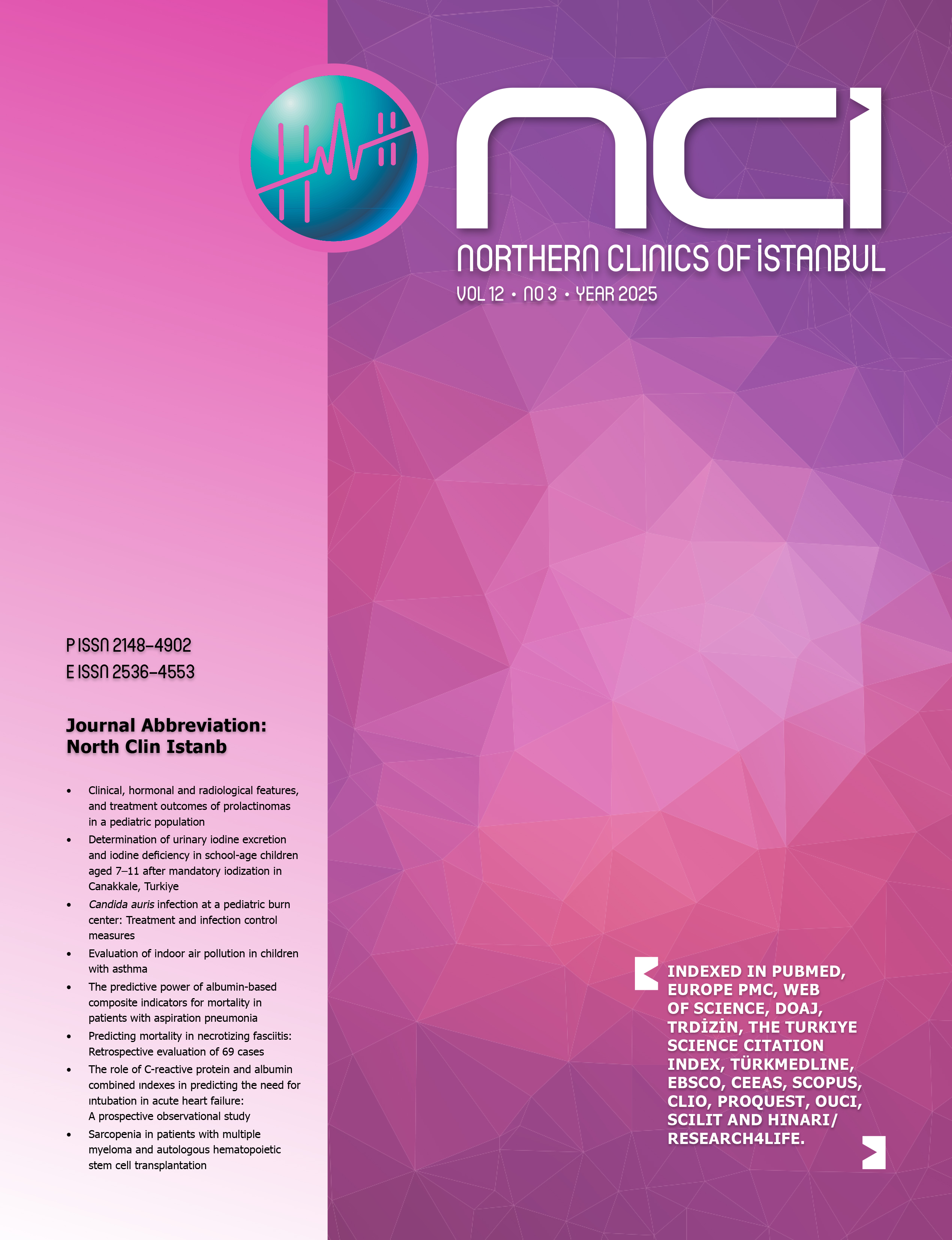Evaluation of hemodialysis patients and hemodialysis health workers with COVID-19 IgM and IgG antibody test; a multicenter study from Eskisehir, Turkiye
Sultan Ozkurt1, Neslihan Tezcan1, Cigdem Mengus1, Bulent Ozgur2, Ozge Alkan Tali3, Emcet Saidoglu4, Hulya Ozarkan5, Handan Golgeli6, Mehmet Erol6, Muzaffer Bilgin7, Ahmet Ugur Yalcin11Department of Nephrology, Eskisehir Osmangazi University, Faculty of Medicine, Eskisehir, Turkiye2Department of Nephrology, Eskisehir City Hospital, Eskisehir, Turkiye
3Department of Internal Medicine, Eskisehir Yunus Emre State Hospital, Eskisehir, Turkiye
4Dialysis Centre, Eskisehir Private Anadolu, Eskisehir, Turkiye
5Dialysis Unit, Private Umit Visnelik Hospital, Eskisehir, Turkiye
6Dialysis Centre, Private RTS Life, Eskisehir, Turkiye
7Department of Biostatistics, Eskisehir Osmangazi University Faculty of Medicine, Eskisehir, Turkiye
OBJECTIVE: Hemodialysis (HD) patients are a population at high risk for exposure to the severe respiratory syndrome coronavirus 2 (SARS-CoV-2) virus. Undiagnosed mild or asymptomatic SARS-CoV-2 infection in HD patients can make these patients a potential source of infection. In our study, we aimed to evaluate the entire spectrum of SARS-CoV-2 infection with the IG M and IG G rapid antibody kit in HD patients and healthcare providers working in HD unit.
METHODS: 633 HD patients and 134 health workers from all dialysis centers (three private and three public) in Eskisehir were included in the study. Blood samples obtained from participants were allowed to clot for 30 min at room temperature at 15°C using a serum separator tube. Then it was centrifuged at 1000 g at 28°C for 15 min. The supernatant was collected and the samples were stored at -20°C until use. Serum samples stored at the end of the study were studied with the A.B.T. Biotechnology COVID-19 Rapid IgG-IgM Diagnostic Test. Routine examination was measured by standard methods. All participants were evaluated by serological analysis of IgG and IgM antibodies against the SARS-CoV-2 recombinant antigen.
RESULTS: Two symptomatic HD patients (0.27%) were diagnosed with SARS-CoV-2 infection by real-time reverse-transcription-polymerase-chain - reaction test and chest tomography. In 15 (2.36%) of 633 asymptomatic patients, antibody was positive against the SARS-CoV recombinant antigen (IgG in 13, both IgG and IgM in 2), while no antibodies were detected in 134 health workers.
CONCLUSION: We have shown that most HD patients with SARS-CoV-2 experience the disease asymptomatically, and that antibody testing plays an important role in identifying patients with asymptomatic infection.
Hemodiyaliz hastaları ve hemodiyaliz sağlık çalışanlarının COVID-19 IgM ve IgG antikor testi ile değerlendirilmesi: Türkiye, Eskişehirden çok merkezli çalışma
Sultan Ozkurt1, Neslihan Tezcan1, Cigdem Mengus1, Bulent Ozgur2, Ozge Alkan Tali3, Emcet Saidoglu4, Hulya Ozarkan5, Handan Golgeli6, Mehmet Erol6, Muzaffer Bilgin7, Ahmet Ugur Yalcin11Eskişehir Osmangazi Üniversitesi, Tıp Fakültesi, Nefroloji Anabilim Dalı, Eskişehir2Eskişehir Şehir Hastanesi, Nefroloji Bölümü, Eskişehir
3Eskişehir Yunus Emre Devlet Hastanesi, İç Hastalıkları Bölümü, Eskişehir
4Eskişehir Özel Anadolu Diyaliz Merkezi, Eskişehir
5Özel Ümit Vişnelik Hastanesi Diyaliz Ünitesi, Eskişehir
6Özel RTS Yaşam Diyaliz Merkezi, Eskişehir
7Eskişehir Osmangazi Üniversitesi, Tıp Fakültesi Biyoistatistik Anabilim Dalı, Eskişehir
Amaç: Hemodiyaliz (HD) hastaları severe acute respiratory syndrome coronavirus 2 (SARS ‐ CoV ‐ 2) virüsüne maruz kalma riski yüksek olan bir popülasyondur. Hafif klinik seyre sahip yada asemptomatik HD hastalarında teşhis edilmemiş SARS‐CoV‐2 enfeksiyonu, bu hastaları potansiyel bir enfeksiyon kaynağı haline getirebilir. Çalışmamızda HD hastaları ve sağlık çalışanlarında Ig M ve Ig G hızlı antikor kiti ile SARS-CoV-2 enfeksiyonunun tüm spektrumunu değerlendirmeyi amaçladık.
Metod: Çalışmaya Eskişehirdeki tüm diyaliz merkezlerindeki (3 özel, 3 kamuya ait) 633 HD hastası ve 134 sağlık çalışanı dahil edildi. Katılımcılardan alınan kan örnekleri, serum ayırıcı tüp (SST) kullanılarak oda sıcaklığında 15°C'de 30 dakika pıhtılaşmaya bırakıldı. Daha sonra 1000g'de 2-8°C'de 15 dakika santrifüj edildi. Süpernatant toplandı ve örnekler kullanılıncaya kadar -20 °C'de saklandı. Çalışma sonunda saklanan serum örnekleri A.B.T. Biyoteknoloji Covid-19 Hızlı IgG-IgM Tanı Testi ile çalışıldı. Rutin testler standart yöntemlerle ölçüldü. Tüm katılımcılar SARS-CoV-2 rekombinant antijenine karşı IgG ve IgM antikorlarının serolojik analizi ile değerlendirildi.
Bulgular: Semptomatik iki HD hastasının (%0.27) real-time reverse-transcriptionpolymerase-chain-reaction (RT-PCR) testi ve göğüs tomografisi ile SARS ‐ CoV ‐ 2 enfeksiyonu tanısı aldığı tesbit edildi. Asemptomatik 633 hastanın 15de (%2.36), SARS-CoV rekombinant antijenine karşı antikor tesbit edilirken (13ünde IgG, 2de hem IgG hem de IgM) 134 sağlık çalışanının hiçbirinde antikor tesbit edilmedi.
Sonuç: SARS-CoV-2 enfeksiyonu geçiren çoğu HD hastasının hastalığı asemptomatik olarak yaşadığını ve asemptomatik enfeksiyonlu hastaları belirlemede antikor testinin önemli rolünü gösterdik. (NCI-2021-8-2/R1)
Manuscript Language: English





















